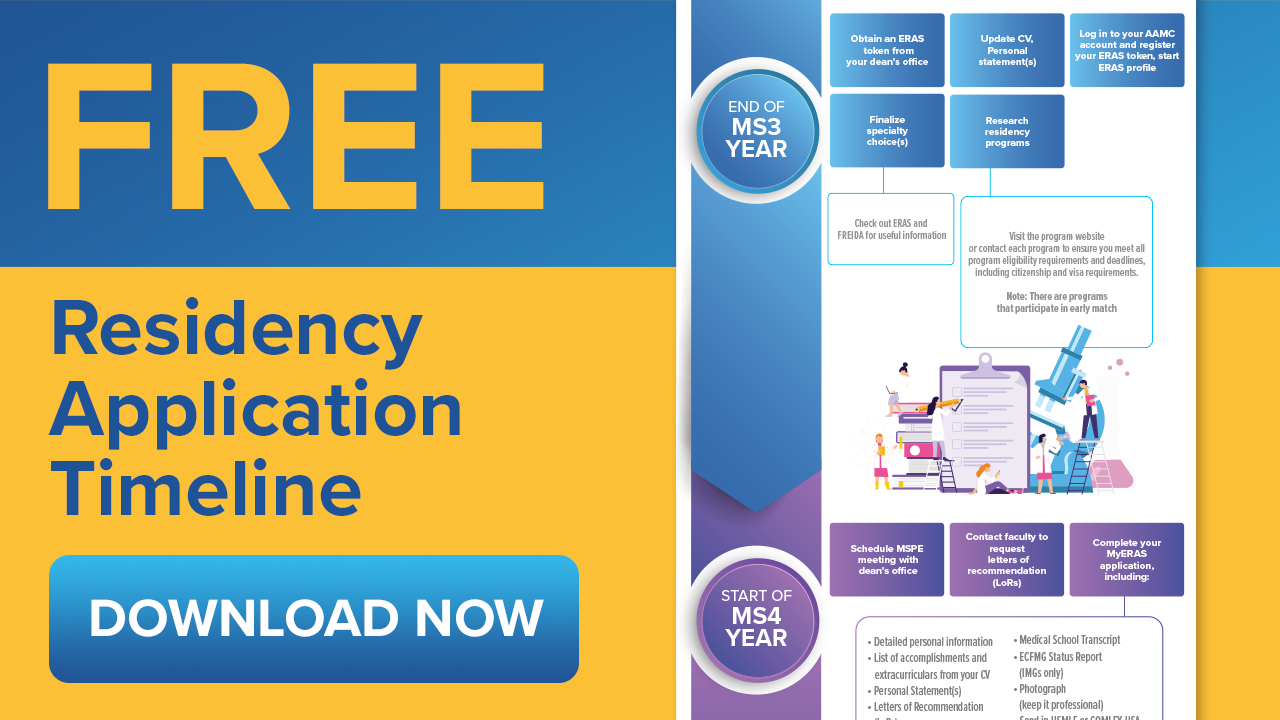Choosing a residency program is an important step along your medical journey. This decision can ultimately guide your career trajectory based on the population you serve, your specific training, and your available opportunities.
Not every residency program is created equal, and each one of them will have unique strengths and weaknesses. Just like applicants, residency programs come in different flavors. Part of the residency match process is helping applicants find the right fit. This should be your goal when creating your list of programs as well. The right residency program for you will be the one that challenges you while nurturing your skills and interests in medicine.
How do you go about choosing which residency program is the best fit for you? There is not one “right” way to approach this question, considering the exercise of evaluating the available programs is constantly evolving along with the programs themselves, as are your changing demands of a program. During this process, however, you will learn a lot about your own goals and your specialty every step of the way during the application cycle. Here are a few things to look for—and watch out for—as you narrow down your choices broken down into the application and interview phases. At the end I will provide you with a list of other considerations applicants often have when selecting a program.
How to Choose the Perfect Residency Program For You
The Application Process
Narrowing down your program list should begin during the application process. ERAS can get expensive, and unless you genuinely cannot afford to be selective, you probably do not need to apply to every program in the country. You want to pick programs where you can realistically see yourself thriving and would actually rank on your list. Some applicants may select a handful of “safety programs,” but that’s at your discretion.
Here are a few important—and perhaps not so important—factors that you may consider before spending your hard-earned cash on applications.
Program Size
How many residents are in each class? How many hospitals does this program serve? And what is the teaching faculty to trainee ratio? Program size is an important aspect, but not the end all be all, as it’s difficult to anticipate which class size is ideal for you. If you already have an idea that you want a lot of coworkers and new friends, maybe a bigger program would be better suited for you. If you want closer access to leadership roles or more one-on-one time with faculty and program leadership, a smaller program could be a better fit.
Another aspect of program size includes coverage. What is the ratio of residency class size to the amount of coverage and call demand? If the ratio is incongruous, that might mean the demands of the program are spreading residents too thin. I’ve seen programs where the resident on call covers the entire hospital’s service, which means more responsibility but also more experience.
Location
Geographical location is another important aspect to consider. Surveys from national institutions reflect that geographic location is one of the top three factors that residents pick programs based on. It boils down to logistics. Access to family support, cost of living considerations, patient populations, and access to busy hospital centers are all important factors tied to geographical location, and all affect your quality of life and quality of training. Do not discount it. Completing residency is a long journey, so pick a place where you could really be happy. So, if you love big cities and access to Level I trauma centers with lots of interesting pathologies, maybe limit your rural program applications to just a few.
Fellowship Programs
Another aspect to consider is the availability of in-house fellowship programs—that is, fellowship programs that fall within the same residency program. If you have an idea of what you want to sub-specialize in going into residency, an in-house fellowship program can be advantageous. During residency, you will familiarize yourself with the program leadership and vice versa. Thus, it’ll be natural for you to stand out as a candidate for that fellowship spot.
Having an in-house fellowship also means that the faculty in your program are leaders in the subspecialty,and you will have a chance to work with them and maybe participate in research with them, which translates into opportunities for publications, thereby strengthening your fellowship application and helping your future career prospects. Even if you end up choosing a different program, these faculty likely know other fellowship directors around the country and can help you achieve your goals. If you’re not sure about the subspecialty just yet, that’s no problem. Availability for in-house fellowships should still be something to keep in the back of your mind.
Ask a Mentor
One source of reliable guidance through life is to seek mentorship from those who have recently gone through a similar path. Maybe you met a few residents during your away rotations or specialty electives who you have a good relationship with. Perhaps there’s someone a few years ahead of you in school who is now in the field you’re applying to. Reaching out to them to ask them about their thought process, and which programs were appealing or not appealing to them, can provide some guidelines or a starting point for your research.
While it’s helpful to talk with mentors, make sure these conversations are simply to inform your path, rather than sway you. If you end up talking to upperclassmen as a starting point, don’t do exactly what they did, as their goals are likely different from yours. Take their advice into the context of what you want. If they’re seeking world-renowned academic success and don’t care about having a poor work-life balance, that doesn’t mean you have to want the same thing. Be honest with yourself and what you want from your career.
Reputation
We live in a world where reputation matters. Residency programs with stellar reputations and household names definitely have the potential to take you places. However, the stars in your eyes shouldn’t outweigh whether or not it’s a good fit for you. With that said, a program’s reputation can afford you unique opportunities, such as access to faculty involved in cutting-edge projects or additional resources. A program with a reputation looks good on your CV, and you can generally expect a certain standard of good training.
While program reputation admittedly affords certain advantages, don’t pick a program solely based on US News & World Report rankings and apply only to the top 20 programs. Doing so will limit your funds and bandwidth to other programs that may be a better fit. Even though reputation can correlate with certain advantages, it’s not guaranteed. Do your homework and use the criteria above to pick the ones that are right for you. If all of the top programs are what you happen to be looking for, by all means. But if you focus solely on reputation, you may end up dissatisfied. Especially when you remember that reputation is based on peer assessment score, essentially a popularity contest, and is subject to change every year.
Program Salary
As opposed to the criteria above, your salary might not be a defining factor when choosing a residency program.The salaries among programs generally won’t differ enough to account for differences in training quality, so now is not the time to be negotiating or focusing on your resident salary. Most residency programs provide enough money (or at least should provide enough money) to cover the cost of living expenses in that city. Receiving an extra five grand to pick a residency program that makes you miserable is not worth it. The big bucks come after residency, so don’t be penny-wise and pound-foolish.

Starting your residency application can feel daunting, with a multitude of aspects to consider and the pressure to do well. If you’re applying to residency soon and aren’t sure where to start, download the FREE Residency Application Timeline to stay on track and make sure your top programs receive your very best residency application!
The Interview Process
The residency interview process is the most valuable resource when selecting your programs. You may feel pressure to perform and come across as the right applicant for the program, but just as importantly, you should be interviewing the program to see if they’re right for you. Just like applicants can have red flags on their application, watch out for red flags from the program while you’re interviewing.
Keep an eye out for nonverbal cues such as unspoken interactions and body language, and keep an ear out for how the program responds to other applicants’ questions. Take notes on your feelings and impressions so that you’re able to keep track of all your thoughts when it comes time to create your rank list.
As a disclaimer, just because you see a “red flag” shouldn’t completely discount your consideration of the program. While you should consider it within the context of the interview day, make sure your priority is still collecting information rather than confirming your suspicions about a program. Remember that most residency programs are fine and the residents have a positive experience.
To remain unbiased, try not to ask too many questions that are skewed toward the negative. If you do ask a question regarding a negative aspect of the program, try and add something positive as well. Ask about strengths and weaknesses, why the residents chose this program, what they enjoy doing in their free time, or how the program has improved over time. If they don’t have much good to say, then that should tell you all you need to know.
Residency Interview Green Flags
Happy Residents
This could be you in the future! Are the residents happy or sad or too busy to even chat with you? Do they seem excited and proud to share aspects of their program? Usually, programs offer either a pre-interview meeting or a post-interview get-together. Some extend invitations for both. This provides you a chance to socialize with residents of the program, usually away from any program leadership presence.
Take advantage of this opportunity to ask the unbridled residents their thoughts on the program: why they chose this program, a day in their life, improvements they would like to see in their program, and how the program has responded to their feedback. Ask about the strengths and weaknesses of the program, and where to find good hospital food. Ask whatever you’d like to know, within reason.
Good Work-Life Balance
Often tied in to a resident’s happiness is work-life balance. Try to get a sense of work-life balance at the program. Interview day usually comes with an informational presentation that should showcase the rotational schedule and the structure of how work is divided in the program. Visualizing a sample block schedule and the day-to-day workflow can help you compare work-life for different programs.
A few questions to ask the residents would be:
- Do they have a chance to see each other outside of work?
- Do they have a chance to hang out with their families, or is work the main theme of all their conversations?
- How busy are the clinic sites?
- On average, how many patients do they see per day?
Positive Steps
Every residency program has room for improvement. A strong positive sign on interview day is if you encounter a program that has taken resident feedback into account and appears to be trying to make positive steps in the right direction.
For instance, let us say a residency program holds didactic lectures at different sites, making it difficult for the residents to gather and creating confusing scheduling conflicts and frequent absences. The chief resident announces this problem at the monthly town hall meeting, there is a quorum, and the issue is then brought up to the administration. Program leadership acknowledges this and works with the residents to come up with a new solution. It is decided that all didactic lectures will be held at a centralized location on one particular weekday. There will be protected time for all residents to attend. Furthermore, lunch will be provided. (Oh man, where do I sign up?)
This kind of positive change is a good indicator that the program listens to and supports its residents, and you can ask this of the faculty or residents, specifically, how the program has changed as a response to resident needs or quality improvement projects.
Residency Interview Red Flags
Negative Interactions on Interview Day
Watch carefully for the interactions among faculty, residents, and program leadership during the interview days. Is the atmosphere congenial and friendly, or forced and robotic? The same expectation of you to act professionally during your interview should extend to interviewers as well. In no way should interview day remind you of a daytime television drama.
Faculty and staff interactions with residents and resident interchanges with other residents should give you an idea of how everyone gets along in the program. If you hear instances of people negatively gossiping about each other, or the absence of any positive interactions between different cohorts within the residency program, that tends to be a bad sign.
Rude Interviewers
You won’t believe this, but it happens! Maybe you’re not the perfect applicant and you have a few shortcomings in your application. That is not an excuse for an interviewer who outright insults you or makes you feel bad about yourself purposefully.
Ideally, interviewers should respectfully give you a chance to explain your situation. If they have a strong opinion on it one way or another, they can and will make note of it in their evaluation. If they show you outright disrespect during the interview, this is a negative sign. It’s possible that you just ran into a bad apple, but then again, maybe the program has more than one.
This scenario has happened to me during an interview before, and I did not end up ranking that program. Remember, if you rank it and ultimately attend that program, you may very well have to deal with that rude interviewer for three (or more) years.
Unsavory Interview Questions
This is a big red flag! If the interviewer is asking you questions they should not be asking you, such as “What is your sexual orientation?” or “What kind of disabilities do you have?” This is a sign of trouble. These types of questions are explicitly not allowed.
If the interviewer is disregarding that rule and asking you anyways, it shows that they have no respect for guidelines and rules that are meant to protect residents. If the interviewer is doing this on interview day, the program is likely known to cross boundaries in the day-to-day as well. I have heard rumors that some specialties are known to ask questions like this, so there’s a possibility that it’s out of your control, but should still be something you take into consideration. Here are some such questions and proper ways to respond from the AAMC.
Residents Leaving the Program
If a resident chooses to leave a program after dedicating so many years of their life to that field, and chooses to pursue something completely different, this should tell you a lot. Sometimes the reason for leaving is truly personal, such as extenuating circumstances including health and family issues. However, if multiple residents have left, or if the program answers questions about residents leaving defensively or individually-blaming, alarm bells should be ringing in your head.
The Ranking Process
Choosing a residency program is such a complex issue with lots of different factors to consider. No single factor should be your end-all-be-all, even things that might stand out as major red flags. Make sure to weigh and consider all factors that matter to you throughout this process.A few other common ones not mentioned above include:
- Ancillary Support How are the nursing staff and medical assistants in the clinic or hospital. Is it a friendly and cohesive team?
- Alumni Network & Career Placement.Where graduates work and how connected they remain.
- Elective & Rotation Flexibility. Will you have the ability to individualize training or explore subspecialties?
- Institutional Resources. Quality of the EMR, simulation centers, board review prep material.
- Post-Residency Job Market Alignment. Is the training style aligned with how you want to practice and do they offer attending positions to recent graduates?
As you go along your application cycle, your goals and perspective might even change and may affect the importance of any given aspect of a residency program. That’s probably why people say “go with your gut.”
If you remain observant and do your homework, you have a greater likelihood of ending up in a program that will serve your needs. I think it’s worth the extra bit of effort to do so.
Looking for more specialty-specific advice? You’re in luck! 🍀 Check out these guides on how to create a rank list for each specialty:
🫀 Internal Medicine
👨👩👧👧 Family Medicine
🏥 Emergency Medicine
👩🍼 OB/GYN
👣 Pediatrics
🧠 Psychiatry
😷 General Surgery
Originally published November 2022 / Updated January 2026





